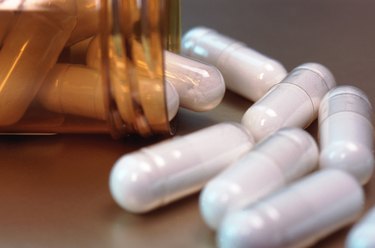
Hypothyroidism, or underactive thyroid, is a condition in which the thyroid gland produces less thyroid hormone. As thyroid hormone regulates the metabolic rate of the body, an underactive thyroid often leads to weight gain. Studies show that individuals with hypothyroidism have low levels of the steroid hormone DHEA. Though DHEA cannot treat hypothyroidism, it may be help prevent some of its symptoms. DHEA is not FDA-approved. So if you consider taking DHEA as a supplement, consult your doctor first.
Hypothyroidism
Video of the Day
In healthy individuals, a deep brain structure called the hypothalamus informs the pituitary gland in the brain when the body needs to burn energy at a higher rate. The pituitary gland responds by secreting thyroid-stimulating hormone, or TSH, which stimulates the thyroid gland to produce the thyroid hormones T3 and T4. In hypothyroidism, the thyroid gland does not respond properly to TSH. So even when the cells need to work harder, the thyroid gland secretes very little thyroid hormone into the bloodstream.
Video of the Day
Causes of Hypothyroidism
Hypothyroidism is often an autoimmune disease, in which your own immune system attacks the thyroid gland. It can also result from a common treatment of hyperthyroidism, or overactive thyroid. Hyperthyroidism can be life-threatening, because it can lead to a thyroid storm, a condition in which the gland secretes extremely high quantities of thyroid hormone into the bloodstream suddenly. A standard treatment of hyperthyroidism is to destroy the gland with surgery or radioactive iodine. This treatment causes hypothyroidism.
Effects of Hypothyroidism
Thyroid hormones control the metabolic rate of your body. When your thyroid hormone levels plummet, your metabolic rate drops. If you continue eating your usual diet, you gain weight. Hyperthyroidism may also lead to brittle fingernails and hair, a puffy face, increased sensitivity to cold, heavy periods, muscle weakness, fatigue, pain in your joints, anxiety, depression and a low libido.
DHEA
Dehydroepiandrosterone, or DHEA, is a steroid hormone produced in the testes of men and in the adrenal glands, which sit atop the kidneys. After it is secreted, it turns into the hormone androstenedione, which then turns into the male and female sex hormones, such as estrogen, progesterone and testosterone. DHEA levels naturally decrease with age and may be implicated in a range of age-related conditions, including skin thinning, osteoporosis and sexual dysfunction.
DHEA and Hypothyroidism
There is evidence that the DHEA levels drop in individuals with hypothyroidism. A study of individuals with hypothyroidism and hyperthyroidism published in the April 2000 issue of "Clinical Chemistry" shows that the DHEA levels in the patients with hypothyroidism were significantly lower than the levels of the controls. There was no difference between patients with hyperthyroidism and controls.
DHEA Treatment
The researchers believe that hypothyroidism is a cause of low levels of DHEA. Thyroid hormones may control the production of steroid hormones from the adrenal glands. If this is right, then you should not take DHEA hoping that it will cure hypothyroidism. It will not affect the activity of the thyroid gland. However, many of the symptoms of hypothyroidism may be a result of the low DHEA levels, including depression, muscle weakness and fatigue. So taking a DHEA supplement with hypothyroidism may alleviate some of these symptoms.